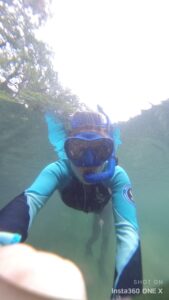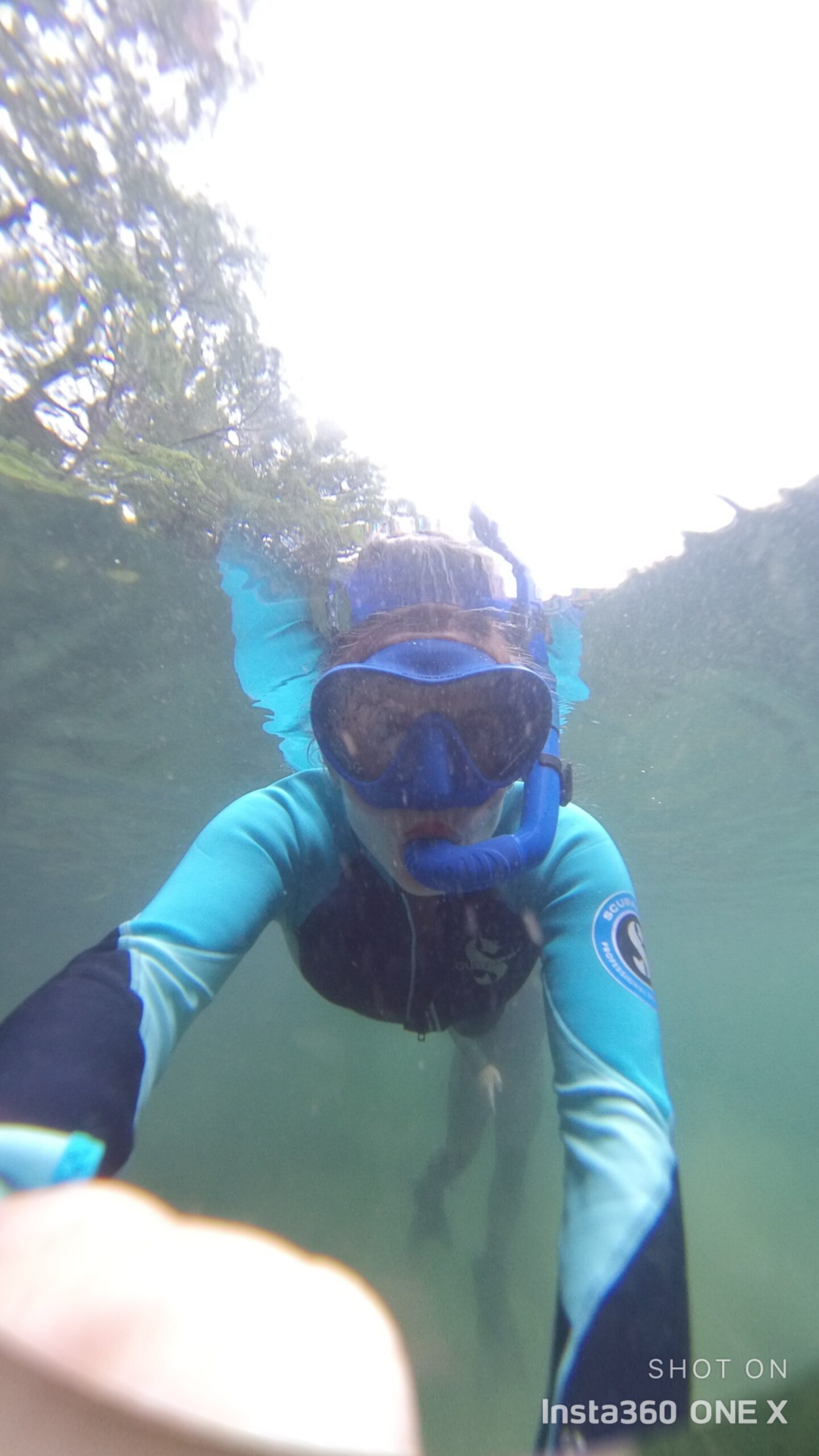Diving into the Depths of Anxiety and Wellness

Dive into the Depths of Anxiety and Wellness
This past week, I was reflecting on a particular experience that vividly reminded me of how our bodies and minds are deeply connected, especially when it comes to anxiety.
I had the chance to visit Devil’s Den, a prehistoric underground spring here in Florida, known for its crystal-clear water and ancient rock formations. It’s a beautiful place, and having slept outside overnight in Florida summer, I was looking forward to the bath of cool water that awaited me.
Yet the cold hit me like a wave, immediately tightening my chest and making it hard to breathe. It was a stark reminder of how our bodies can react to stressors, even when our minds are perfectly calm. For a brief moment, I felt the physical sensations of anxiety – shortness of breath, a pounding heart – even though I wasn’t mentally anxious at all.
It struck me how closely this mirrors the experience many of us have with anxiety today. In my younger years, I didn’t even know what the word “anxiety” meant. I recall a time when I was out to breakfast with my dad at a little diner. I was just five years old, and I had a lovely conversation with a lady and her husband at the next table. After we parted, she remarked to my dad, “Is she five or 40?” That comment has stuck with me ever since.
Looking back, I realize that back then, people simply didn’t talk about anxiety as we do now. But today, it’s a word I hear almost everywhere. Just this morning, while I was out to breakfast, I overheard a little five-year-old girl talking about her anxiety. It’s heartbreaking to think that even children so young are already familiar with such a heavy concept.
Why has anxiety become so prevalent? The reasons are many and varied. The sociological impacts of COVID-19 have certainly played a role. We’ve all been through a collective trauma of sorts – a global event that has left many of us feeling uncertain, isolated, and anxious. But beyond the pandemic, there are other contributing factors: nutrient deficiencies, lack of proper hydration, and the constant exposure to environmental toxins that affect our bodies in ways we’re only beginning to understand.
One of the most enlightening perspectives I’ve come across in my journey as a practitioner is the concept of “Herbs as Nutrition instead of Medicine.” Traditional Chinese Medicine (TCM) views herbs not just as remedies for when we’re unwell but as daily allies that support our overall health and resilience. Adaptogens like Ashwagandha or Astragalus help our bodies adapt to stress, making us stronger over time. Daily detox herbs like Dandelion and Milk Thistle help keep our bodies clear of toxins and resistant to parasites, ensuring that we stay balanced and less prone to anxiety. I have taken a nutritional blend of herbs, which is something herbalists call a “constitutional formula” for years, and I have seen the improvements in my general health and in my diagnostic markers as a result.
These natural solutions are powerful tools in maintaining our wellness. Just as my body responded to the cold water at Devil’s Den, our bodies react to the stresses of daily life. But by integrating herbs, proper nutrition, and advanced therapies, we can equip ourselves to handle these challenges more effectively.
At Longevity Wellness, we’re dedicated to helping you navigate these waters. Whether it’s through TCM, modern biohacking techniques, or a combination of both, we’re here to support your journey towards a more balanced, anxiety-free life.
Here’s to diving deep into wellness, and finding calm in the depths.

Unlocking Calm: The Ancient Secret to Conquering Anxiety in a Modern World
What if I told you that the key to overcoming anxiety lies not in your medicine cabinet, but in a centuries-old practice that taps into the deepest levels of your body’s natural healing power? Imagine a world where anxiety doesn’t rule your life, where your mind and body work in perfect harmony, and where every breath you take fuels a sense of calm and control. In this blog, I’m going to reveal how the time-tested principles of Traditional Chinese Medicine (TCM), combined with the latest advancements in wellness technology, can transform the way you handle anxiety—naturally, effectively, and sustainably. Get ready to discover a new path to serenity that integrates the wisdom of the past with the innovations of today.
The Hidden Roots of Anxiety: A TCM Perspective
In Traditional Chinese Medicine (TCM), anxiety is not just seen as a psychological issue; it is a manifestation of deeper imbalances within the body, particularly in the flow of Qi (vital energy) and blood. TCM recognizes that the heart and kidneys play crucial roles in these processes, which is why disturbances in these organs can often lead to emotional and mental unrest. This understanding is deeply embedded in the language and philosophy of TCM, where the word for “heart” (心, xīn) is the same as the word for “mind.” In this tradition, there is no clear distinction between body and mind; they are seen as one integrated entity. Thus, emotional imbalances are directly linked to physical health, and vice versa.
When someone experiences anxiety, TCM practitioners look for underlying patterns of imbalance that might be contributing to the condition. For instance, two common but opposite diagnoses in TCM are Qi deficiency and Qi stagnation. For example, if your Qi is stagnant or deficient, you might experience restlessness, insomnia, or palpitations—all common symptoms of anxiety. TCM uses techniques like acupuncture, herbal remedies, and Qi Gong exercises to unblock energy pathways, nourish vital organs, and restore balance, leading to a profound sense of inner calm.
What’s the difference between deficiency and stagnation?
- Qi Deficiency occurs when the body’s energy is depleted, leading to feelings of fatigue, weakness, and anxiety that may present as a constant sense of unease or worry. People with Qi deficiency are often advised to eat nourishing, energy-boosting foods like oats, sweet potatoes, chicken, and cooked vegetables, which help to rebuild the body’s energy reserves.
- Qi Stagnation, on the other hand, refers to a blockage or restriction of energy flow, often resulting in symptoms such as irritability, frustration, and anxiety that feels more like a trapped or pent-up emotion. For this condition, foods that help to promote circulation and release trapped energy, such as green tea, turmeric, garlic, and lightly steamed greens, are recommended.
These examples illustrate how TCM treats anxiety not merely as a symptom but as a sign of broader imbalances within the body. By addressing these imbalances with targeted dietary choices, herbal remedies, and practices like acupuncture and Qi Gong, TCM aims to restore harmony, thereby alleviating anxiety at its root.
This holistic approach underscores the TCM belief in the interconnectedness of mind and body, where every emotion has a corresponding physical component, and treating one inherently involves treating the other.

The Synergy of TCM and Modern Biohacking
As biohackers, we often look to the latest tech—whether it’s wearable devices, cold plunges, or infrared saunas—to optimize our health. But the most effective biohacks often take us back to basics: optimizing sleep, improving hydration, and fine-tuning our diet. TCM perfectly complements this approach by offering ancient strategies that align with these modern goals.
At Longevity Wellness, we integrate advanced tools like Vasper, Bemer, and LED light therapy with TCM principles to create a powerful synergy that addresses both the physical and energetic aspects of anxiety. For instance, Vasper’s compression and cooling technology can enhance the calming effects of acupuncture by boosting circulation and supporting the body’s natural endorphin release. Meanwhile, Bemer therapy’s ability to improve microcirculation amplifies the benefits of herbal treatments, ensuring that every cell in your body receives the nutrients and energy it needs.
Herbs as Daily Nutrition: Strengthening the Body and Mind
One of the most compelling aspects of TCM is its holistic approach to herbs. Rather than viewing them solely as remedies for illness, TCM regards herbs as daily nutrition—tools to maintain and enhance your health over time. This concept is particularly relevant in managing anxiety, where the goal isn’t just to alleviate symptoms but to build resilience against stress.
Different people require different herbs because individual health needs are influenced by various factors, such as cultural background, age, gender, and lifestyle. For instance, a young, active person may need herbs that support muscle recovery and energy, while an older individual might benefit from herbs that promote joint health and cognitive function. Cultural background can affect how the body responds to certain herbs, and gender can influence hormonal needs. Lifestyle factors like exercise level and diet also play a role, making personalized herbal recommendations essential for effective health support.
Adaptogens like Ashwagandha, Rhodiola, and Reishi are key players in this strategy. These herbs help your body adapt to stress by regulating cortisol levels, improving sleep quality, and boosting overall energy. Unlike pharmaceuticals, which often only mask symptoms, adaptogens work with your body’s natural processes, making you stronger and more resilient over time.
Daily Detox Herbs like Dandelion, Milk Thistle, and Burdock root are another cornerstone of TCM biohacking. These herbs support your liver and kidneys, helping to clear toxins from your body and maintain optimal organ function. By keeping your system clean and balanced, you’re less likely to experience the physical imbalances that can trigger anxiety.
The Modern Epidemic of Anxiety: Why Now?
Anxiety is nothing new, but its prevalence in today’s society is undeniable. Several factors contribute to this modern epidemic:
- Sociological Impacts of COVID-19: The pandemic has been a global stressor, causing disruptions in every aspect of life. The resulting uncertainty, isolation, and economic challenges have made anxiety a common experience for many.
- Nutrient Deficiencies: Modern diets, often high in processed foods and low in essential nutrients, can exacerbate anxiety. Deficiencies in magnesium, B vitamins, and omega-3 fatty acids are particularly linked to increased anxiety levels.
- Hydration: It’s easy to overlook, but dehydration can have a significant impact on your mental health. Even mild dehydration can cause symptoms of anxiety and fatigue, making it crucial to stay hydrated.
- Environmental Toxins: We’re constantly exposed to toxins in our environment, from pollutants in the air to chemicals in our food and water. These toxins can disrupt your endocrine system and contribute to anxiety.
Empower Yourself with TCM Biohacking
By integrating the ancient wisdom of TCM with modern biohacking techniques, you can create a personalized strategy for managing anxiety that is both natural and effective. Start with the basics: ensure you’re getting quality sleep, staying hydrated, and nourishing your body with whole, nutrient-dense foods. Then, incorporate TCM practices like acupuncture, Qi Gong, and herbal supplements to restore balance and build resilience.
At Longevity Wellness, we’re here to guide you on this journey. Whether you’re looking to reduce anxiety, boost your energy, or simply improve your overall well-being, our approach combines the best of both worlds—ancient wisdom and cutting-edge technology. It’s time to unlock the calm and control that you deserve.



